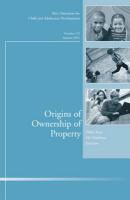Read more
This volume investigates emerging theories in the psychological basis of ownership. Although it has been a neglected area of developmental psychology research, ownership is of broad significance in childrens' lives. Sharing, borrowing, buying, trading and stealing - the abstract concepts of ownership are reasoned early in childhood.Editors Ori Friedman, associate professor of psychology, University of Waterloo, and Hildy Ross, professor emeritus, University of Waterloo, argue that the study of ownership and its development provide important new directions for psychological study. Contributing authors outline the new research from perspectives drawn from the various subfields of developmental psychology. Topics include: OL {list-style: disc}P: {margin-left 60px}Property in Nonhuman PrimatesPossessional and Morality in Early DevelopmentEarly Representations of OwnershipProperty Rights and the Resolution of Social ConflictOwnership as a Social StatusOwnership and Object HistoryExploring Ownership in a Developmental ContextThis is the 132nd volume of the Jossey-Bass quarterly report series "New Directions for Child and Adolescent Development." The mission of this series is to provide scientific and scholarly presentations on cutting edge issues and concepts in the field of child and adolescent development. Each volume focuses on a specific new direction or research topic, and is edited by an expert or experts on that topic.
List of contents
1. Twenty-One Reasons to Care About the Psychological Basis of Ownership (Ori Friedman, Hildy Ross) This introductory chapter answers the question of why ownership and its development provide important new directions for psychological study. 2. Property in Nonhuman Primates (Sarah F. Brosnan) Brosnan provides evidence of nonhuman primates' respect for possession, but limited ownership, and argues that primate lifestyles are not conducive to establishing the social and institutional controls that support property. 3. Possession and Morality in Early Development (Philippe Rochat) Rochat outlines a six-level developmental theory through which children gradually incorporate moral considerations into a sense of ownership and possession. 4. Early Representations of Ownership (Peter R. Blake, Paul L. Harris) Blake and Harris consider how young children represent ownership based on two potentially competing sources of information-observed associations between people and objects, and others' testimony about who owns what. 5. Property Rights and the Resolution of Social Conflict (Hildy Ross, Cheryl Conant, Marcia Vickar) These authors examine the discrepancy between how young children and their parents regard ownership, especially as it applies to conflict between siblings and peers. 6. Ownership as a Social Status (Charles W. Kalish, Craig D. Anderson) Kalish and Anderson argue that ownership is a social construct, and consider whether children view it as such. 7. Ownership and Object History (Ori Friedman, Karen R. Neary, Margaret A. Defeyter, Sarah L. Malcolm) These authors argue that inferences about the history of an object are fundamental to judgments about whether an object is owned and, if so, by whom. 8. Exploring Ownership in a Developmental Context (Nicholaus S. Noles, Frank C. Keil) In this chapter, the authors examine how children judge which things can be property, who can be an owner, and how children reason about ownership transfers. INDEX.

